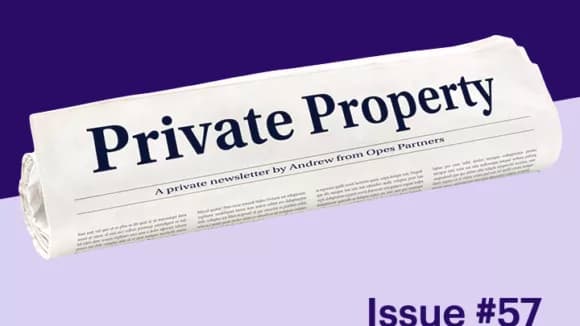
Property Investment
Property Investment
3 min read

Author: Andrew Nicol
Managing Director, 20+ Years' Experience Investing In Property, Author & Host
Reviewed by: Laine Moger
Journalist and Property Educator, holds a Bachelor of Communication (Honours) from Massey University.
Private Property – our weekly newsletter that gives you insights into what's happening in the NZ property market. Written by managing director Andrew Nicol. Sign up to receive this in your inbox every Thursday.
The good news keeps rolling in.
The Reserve Bank plans to grease the wheels of the NZ housing market.
Yesterday the central bank announced they will soon let more Kiwis borrow with lower deposits.
They’ll do this by tinkering with the LVR restrictions. Those restrictions say how much deposit you need to get a mortgage from the bank.
But before we get to that. There was one other titbit of information in the Reserve Bank’s release that many media commentators missed.
The deputy governor of the Reserve Bank, Christian Hawkesby, said: “National house prices have fallen towards a level that is more consistent with medium-term fundamentals”.
That sounds wordy (and nerdy) … but what he said matters.
For the last year, the Reserve Bank has said that house prices are above their ‘sustainable level’.
This is the first time they’ve hinted that house prices are nearing sustainability.
Whenever I post about house prices on social media, suggesting that they won’t fall much more … there’s always someone saying they’re guaranteed to drop another 20%.
In their mind, house prices are still “too high.”
There’s no doubt that houses are expensive.
But, this is the first time the Reserve Bank has suggested that property prices are where they should be based on medium-term market fundamentals.
Add this to the evidence pile if you’re looking for reasons that the end of the house price downturn is near.
This will be aided by the changing LVR restrictions.
There are two main changes –
Investors will soon need a 35% deposit when purchasing an existing property. That’s down from a 40% deposit.
This is welcome news for renovations-focused investors.
And now banks can lend more money to people with low deposits who are buying a home to live in. This type of lending can now make up 15% rather than 10% of their loan book.
This will help first-home buyers – but probably not by much (more on this below).
Investors will be the ones who benefit most from yesterday’s announcement.
There is a double impact whenever the Reserve Bank changes the deposits required for investors.
First, investors can borrow more against the investment properties they already own.
Instead of only being able to borrow 60% against an investment property, now they can borrow 65%.
On top of that, if investors want to purchase a new property. Rather than a 40% deposit, they only need a 35% deposit.
That change may not sound that impactful. But the two impacts need to be looked at together.
Let’s say an investor owns a rental property worth $1 million with a $400k mortgage.
Before yesterday’s announcement, they could only afford to buy another property worth $500k.
Under the new change, they can now afford a property worth $714k. A massive $214k difference.
That’s because they can now borrow more against the property they already own. And they don’t need as big of a deposit for the new one they want to buy.
Not all property investors will see this large of a change.
But, some investors will find they can now buy when they couldn’t before.
The change will impact investors more than owner-occupiers.
That’s because investors with mortgages make up about 25% of the market.
Owner-occupiers make up about 60% of the property market. And the Reserve Bank’s 5% boost to low deposit lending means that only 3% of the market will be impacted – (60% x 5% = 3%).
On top of this, even when the cap for low deposit lending was higher, the banks never hit it.
In fact, by the Reserve Bank’s own data, more than 10% of bank lending is with less than a 20% deposit.
That’s because the data doesn’t take into consideration the exemptions from the LVR rules (new builds, refinancing etc.).
The critical point is that this change may not impact owner-occupiers much … because the banks weren’t lending up to the limit previously.
The main impact will be on investors. And after last week’s inflation news, the evidence is starting to pile up that the end of the housing market downturn is near.
Managing Director, 20+ Years' Experience Investing In Property, Author & Host
Andrew Nicol, Managing Director at Opes Partners, is a seasoned financial adviser and property investment expert with 20+ years of experience. With 40 investment properties, he hosts the Property Academy Podcast, co-authored 'Wealth Plan' with Ed Mcknight, and has helped 1,894 Kiwis achieve financial security through property investment.
This article is for your general information. It’s not financial advice. See here for details about our Financial Advice Provider Disclosure. So Opes isn’t telling you what to do with your own money.
We’ve made every effort to make sure the information is accurate. But we occasionally get the odd fact wrong. Make sure you do your own research or talk to a financial adviser before making any investment decisions.
You might like to use us or another financial adviser